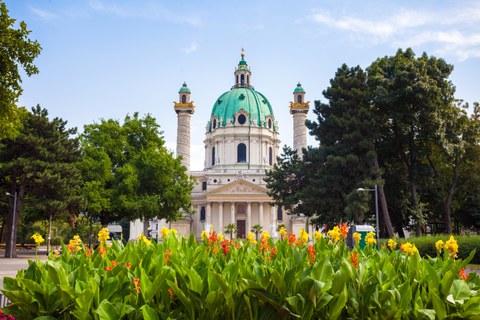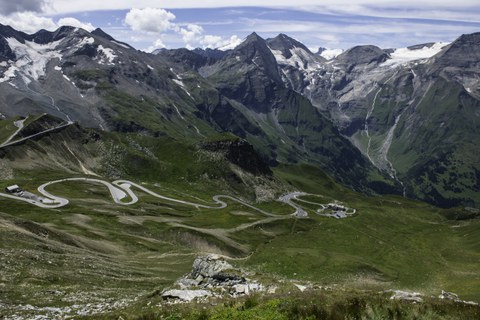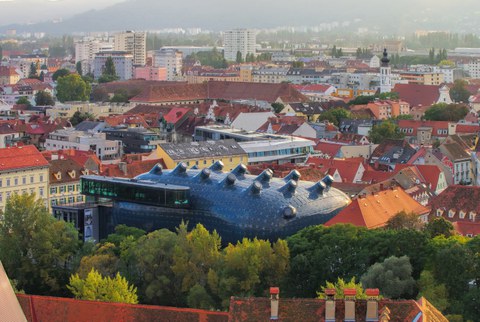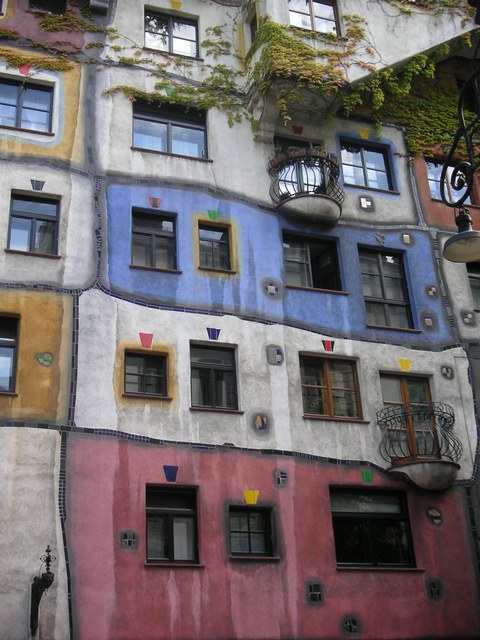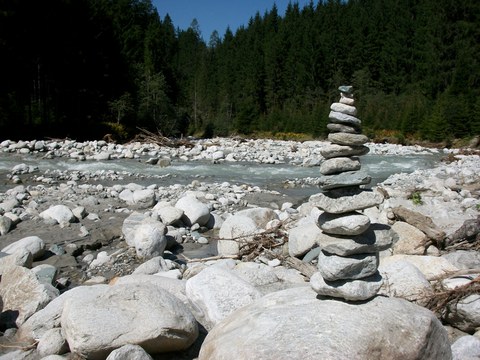Partner Country of the Month December 2020: Austria
Austria. Surely some are surprised about this selection, because supposedly one knows the neighboring country well: Same language, already spent several vacations in the Alps and now and then one likes to eat a "Wiener" Schnitzel. If one is not mistaken there for once...
With the "Partner Country of the Month" campaign, we want to shine a spotlight on the wide diversity of countries, regions and partner universities of TU Dresden that our students can explore during a semester abroad.
Table of contents
General facts and figures about Austria
Capital: Vienna
Population: 8.9 million
Official language: German (There are also regional official languages, such as Croatian, Slovenian, Hungarian).
National holiday: 26 October
Currency: Euro
You can find further facts, figures and information on Wikipedia or at Austria Info.
Language matters
Austrian German - a variety of German - is the mother tongue of about 88.6% of Austrian citizens. It has a specific vocabulary and special features in grammar, pronunciation and spelling that differentiate it from the type of German spoken in Germany.
Did you know that ....?
-
Austria has the highest number of funeral homes per capita in Europe? Vienna is also home to the second largest cemetery in Europe with more than 2.5 million graves (more than Vienna has inhabitants ;).
-
Austria has no nuclear power plants?
-
a quarter of the Austrian population lives in Vienna?
-
Steven Spielberg owes his surname to the town of Spielberg in Austria? His ancestors, among others, came from Austria.
-
there is a cinema in Vienna where the light is not switched off (& only dimmed) during the screening so that the visitors can knit during the screening?
Cooperation with TU Dresden
You can find all cooperations of TU Dresden in our database. Have a look at the experiences of our previous exchange students at Questionnaires. Professors at your faculty may have direct contacts to your partner university of choice and can advise you.
Our cooperations with Austrian universities are part of Erasmus+. You can find the contact persons and application deadlines for your faculty here.
Our Austrian partner universities via Erasmus+
- Pädagogische Hochschule Burgenland in Eisenstadt
- General Education Science
- Karl-Franzens-Universität Graz
- Social Pedagogy
-
Catholic Theology
-
Psychology
- Innsbruck University
-
Business Administration and Economics
-
Civil Engineering
-
-
Medizinische Universität Innsbruck
-
Medicine
-
- Pädagogische Hochschule Tirol in Innsbruck
- Vocational Education
-
Alpen-Adria-Universität Klagenfurt
-
Social Pedagogy
-
Electical Engineering and Information Technology
-
-
Private Pädagogische Hochschule der Diözese Linz
-
Vocational Education
-
-
-
History of Art
-
- Akademie der Bildenden Künste Wien (Vienna)
- Architecture
- Medizinische Universität Wien (Vienna)
-
Medizin
-
-
Vienna University of Technology
-
Geosciences
-
Landscape Architecture
-
Electrical Engineering and Information Technology
-
Civil Engineering
-
Computer Science
-
Architecture
-
Hydro Sciences
-
Process and Environmental Engineering
-
Fluid Mechanics
-
-
Universität für Bodenkultur Wien (Vienna)
-
Landscape Architecture
-
Hydro Sciences
-
Forest Sciences
-
- Universität Wien (Vienna)
- History
- Social Pedagogy
- History of Art
- Psychology
Don't miss...
the Grossglockner High Alpine Road: The high alpine mountain road that connects the Austrian provinces of Salzburg and Carinthia. The 48-kilometer-long pass road leads through the middle of the Hohe Tauern National Park. A highlight is the Edelweiss peak, the highest point of the mountain road at 2,500m, as well as the 3,798m high Großglockner - the highest peak in Austria.
the Kunsthaus in Graz: not only an attraction when viewed from outside; inside it houses changing exhibitions of contemporary art and is therefore appreciated by art lovers and fans of unusual architecture alike.
the works of Friedensreich Hundertwasser in Austria: art lovers should not miss the Hundertwasser House in Vienna during an Austria vacation. Further works are for example the district heating power station Spittelau, the Therme Rogner in Bad Blumau and the freeway service station in Bad Fischau.
the Krimml Waterfalls: they are the five highest waterfalls in the world and are worth a visit at any time of the year, just as the entire Hohe Tauern National Park always invites you to visit.
In general, Austria has a lot to offer for all those who like to be active in the fresh air, whether you like winter sports, hiking or climbing or if you want to be active on the water. But also art and music lovers and city tourists will find numerous highlights in Vienna, Salzburg or Graz, for example.
Let's get cooking...
We could of course present you the classics, like Wiener Schnitzel (with veal please!) or Sachertorte, but that would be too easy. Also Kaiserschmarrn and Apfelstrudel (apple strudel), we're sure everybody has eaten or maybe even made them themselves. (By the way, as a tourist you can get the recipe and the method explained to you at Schönbrunn Palace and try it afterwards).
Instead, this time we will conjure up a classic semolina dumpling soup with you, which requires few ingredients and can be refined according to taste.
You need (for 6 portions):
- 30 g butter
- 80 g durum wheat semolina
- 1 egg
- 2 pinches of salt
- 1 pinch of nutmeg
- 750ml water
- Soup spice / stock cube / stock
- Cream the butter with the egg and the salt and nutmeg. Then stir in the semolina and let it stand for about 10-15 minutes.
- Meanwhile bring the water to boil in a pot. Sprinkle soup spice (homemade or ready), add salt or warm the stock.
- Form "Nockerl" from the semolina mixture with a spoon and add to the soup. Cover and let it simmer for about 10 minutes (not boiling).
- If you like you can sprinkle chives on top at the end.
Contact
Have you had a great time in Austria? Which song do you like better: This one or that one or rather a picture book? What is your favourite Austrian dish? Do you have tips for places and experiences that are not to be missed? We would be happy to share your experiences here, on social media or, if you want, in information events for other TUD students. Get in touch with us:
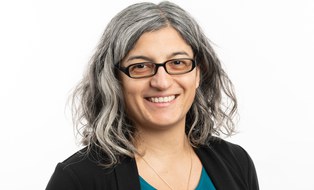 © Sven Ellger/TUD
© Sven Ellger/TUD
Advice on studying abroad
NameMs Federica Serra
Infocenter/ Study abroad; TUDworldwide: America
Send encrypted email via the SecureMail portal (for TUD external users only).
Visiting address:
Fritz Foerster Bau, Office 161 Mommsenstraße 6
01069 Dresden
Postal address:
TUD Dresden University of Technology International Office
01062 Dresden
Office hours:
- Tuesday:
- 09:30 - 11:30
- 12:30 - 14:30
- Thursday:
- 09:30 - 11:30
Please register at the SCS (FOE, floor 0).
Looking for first-hand information?
Would you like to know more about Austria? Ask our alumni ambassadors - TUD alumni who are active in many countries around the world and can give you information and advice for your stay abroad.
Getting in touch is very easy: On this interactive world map, markers indicate the cities where our alumni ambassadors live. There is a short profile with contact information for each ambassador.
Partner Countries Archive
Have you missed a partner country? No problem! Here you can read up on all articles.
|
Europe (Erasmus+) |
|
|
Africa |
|
|
America |
|
|
Asia |
|
|
Australia and Oceania |
|

